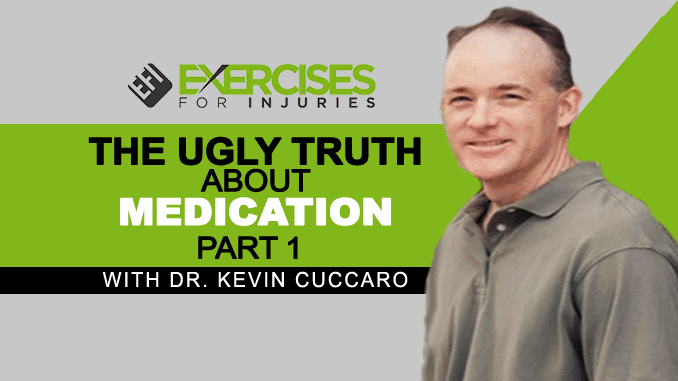
Medication is a chemical substance used to treat, cure, and prevent diseases or other conditions. Medications can be prescription drugs or over-the-counter drugs. The word “medicine” generally refers to medications used for disease treatment, but it can also have other meanings, and it’s an ugly truth about medication.
Using medications is not the same as taking care of your body. Whether over-the-counter or prescribed, you should know how to use medications properly to be most effective. It’s always advisable to ask a physician or pharmacist before you start using a new medication of any kind.
Today, I have another video interview for you about medication. As he talks about medicine and health care, let’s uncover “The Ugly Truth About Medication” with Dr. Kevin Cuccaro.
CLICK HERE to watch the YouTube video.
How do Medications Work?
Medications get into the body in several different ways. The way the medication enters the body is called the “route.” The most common “route” for medications is orally (by mouth) in pills, capsules, or liquids. However, if the person cannot take medications this way, or if the medication is not available in oral form, medications can enter the body by other routes.
Here are the different routes:
- Oral
- Nasal (into the nose)
- Buccal (placed in the cheek)
- Sublingual (place under the tongue)
- Eye drops and ear drops
- Transdermal (through the skin)
- Enteral (directly into the stomach or intestine)
- Inhaled
How do Medications Affect You?
Most of us know that medications help cure diseases and improve health conditions, but we are unaware of their impact on our bodies.
Indeed, the ugly truth about medication. Medications, like any chemical substances, affect our bodies when taken in high doses. The impacts can be seen both short-term and long-term, depending on the type of medication. The most common side effects include changes in sleep patterns, headaches, stomach aches, constipation, tiredness/fatigue, and nausea/vomiting.
Several types of effects:
- Desired effect: the medication is doing what it is supposed to do
- Side effect: symptoms that result from a normal dose of medication
- Tolerance and Dependence: this can happen when over time or with repeated dosages; when an individual develops a physical or psychological need for a medication
- Interactions: occur between medications and food
- No apparent effect: it is not working
- Paradoxical effect: works in the opposite way
The Chronic Disease in Society Today
Chronic disease is defined as a disease that lasts for one year or more, requires medical attention, and limits some daily activities. Examples of this are:
Behavioral Diseases
- Anorexia Nervosa: abnormally low body weight; an intense fear of gaining weight
- Bulimia Nervosa: eating a large amount of food, then purge
- Drug Use
- Anxiety
- Depression
Lifestyle Diseases
- Heart Disease
- Diabetes
- Stroke
- Obesity
- Metabolic Syndrome
- Some types of Cancer
How to Effectively Address these Chronic Diseases?
To address these chronic diseases, you must find the underlying factors of this disease to stop them from worsening. This is why it is imperative to understand how these diseases develop and what can be done to address them.
Many factors contribute to these chronic diseases, varying from person to person. Some people may be more susceptible than others due to genetic reasons, while others may have lifestyle habits contributing to their risk of developing a particular disease.
The risk factors for some chronic diseases include obesity, smoking, alcohol consumption, and a sedentary lifestyle.
How do Pharmaceutical Companies Expand their Market for Medication?
Big pharmaceutical companies aren’t that different from small ones. The biggest difference is the size of the market they serve. Big Pharma is concerned with expanding its markets for medications. In contrast, a small pharmaceutical company will focus on making its product as effective and profitable as possible in the area they already serve.
Pharmaceutical companies understand that expanding the market for medication requires more than just advertising which is the ugly truth. However, there are multiple ways of getting more people to buy the medications you make, including:
- Looking for a large population that doesn’t have a lot of drugs that are being treated.
- Looking for patient advocates that will serve as the grassroots of the information about the medications
- Promoting awareness
- Started a non-profit foundation saying that this is a big problem
- Working with physicians and other medical professionals
Negative Aspects of Medication Treatment
One of the reasons why people don’t take their medical conditions seriously is because they’re not educated. Many people lack understanding about their diseases, leading to poor health practices and worse illnesses, which is an ugly truth.
We usually use medications to treat a disease, but there is also a disease that worsens if we try to treat it. This is because the disease might not be the only problem in an organism. There might be another cause of the problem that needs to be fixed too.
The 4 Best Treatments for Chronic Disease
Exercise
The Centers for Disease Control and Prevention (CDC) recommends that adults engage in 150 minutes of moderate-intensity aerobic exercise, 75 minutes of vigorous-intensity aerobic exercise, or some combination of the two each week.
Regular exercise can reduce the risk of chronic diseases such as heart disease, stroke, type 2 diabetes, high blood pressure, depression, and some types of Cancer.
Avoid Complex Carbohydrates
The easiest way to avoid getting sick is to cut out the complex carbohydrates from your diet. Complex carbohydrates like bread, pasta, and cereals are converted into sugar if an excess spikes your blood sugar levels and increases inflammation in the body. These spikes increase the risk of heart disease, diabetes, and Cancer.
Instead of eating these carbs, eat more vegetables, fruits, and lean meats. Keep your meals simple and focus on eating whole foods that won’t cause inflammation in the body.
Eat Fruits and Vegetables
Fruits and vegetables are rich in vitamins, minerals, and antioxidants that can lower blood pressure, reduce the risk of heart disease and stroke, some types of Cancer, and eye and digestive problems, and positively affect blood sugar, which can help keep appetite in check. You must eat non-starchy fruits and vegetables like apples, pears, and green leafy vegetables that can also promote weight loss. The glycemic load of these fruits and vegetables is not high, preventing blood sugar spikes that can increase hunger.
Avoid Stress
Constant stress experienced over a prolonged period can contribute to long-term problems for the heart and blood vessels. This causes an increased heart rate and elevates stress hormones and blood pressure levels.
Takeaway
A patient must be in a good state of health to use medications. This is because the use of medications without proper precautions can be dangerous. It may cause side effects that could worsen an illness or condition or even create new symptoms that were not present before.
There are certain things to keep in mind when using medications:
-Talk with your doctor about your symptoms and any other medical conditions if you use more than one type of medication. Your doctor will help you decide which medication is best for you and how to take it properly.
-Do not use medications without consulting a physician, pharmacist, or another healthcare provider, because this can lead to an adverse event and can potentially cause harm to your health.
For your guide to the best foods to heal your body, check out The Best Foods that Rapidly Slim & Heal in 7 Days here!




